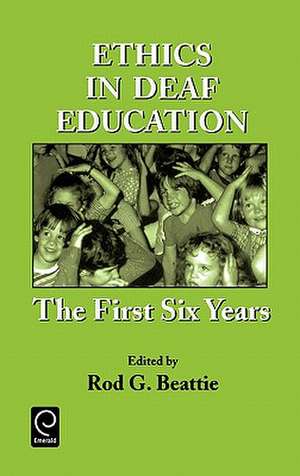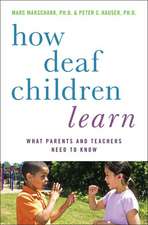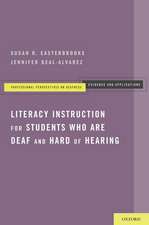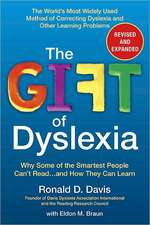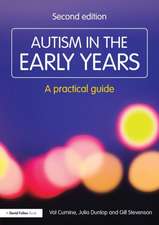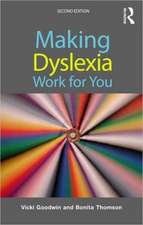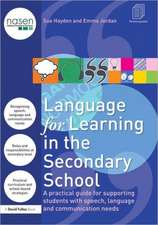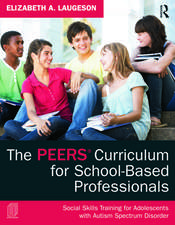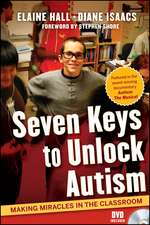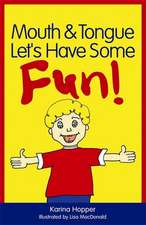Ethics in Deaf Education – The First Six Years
Autor Rod G. Beattieen Limba Engleză Hardback – 23 sep 2001
Ethics in Deaf Education introduces and clarifies, in a structured manner, the many possible ethical considerations concerning the provision of educational services and habilitation for young children with hearing losses. The decisions that parents or guardians make on behalf of their children, often based on the contributions of educators, habilitation/rehabilitation specialists, and the Deaf and medical communities, deserve an airing in a comprehensive manner. What are the issues concerning amplification, implantation, visual communication systems, and sign languages? What technological route should the parents take? What language should they be trying to develop in their child? What educational setting and approach will best satisfy the needs of their child and themselves for the present and foreseeable future?
No other book has combined the factors of ethics, education, and deafness, to discuss a variety of topics that concern parents and professionals who have and work with young children with hearing losses. Concise, readable chapters have been written by a cross-section of experienced academics, researchers, and educators; each begins with an "ethical dilemma" and expands to consider new technologies and educational options. Each chapter ends with a list of suggested readings and ethical questions for consideration.
Preț: 798.29 lei
Preț vechi: 1036.75 lei
-23% Nou
Puncte Express: 1197
Preț estimativ în valută:
152.75€ • 159.81$ • 126.89£
152.75€ • 159.81$ • 126.89£
Carte tipărită la comandă
Livrare economică 02-16 aprilie
Preluare comenzi: 021 569.72.76
Specificații
ISBN-13: 9780120835225
ISBN-10: 0120835223
Pagini: 264
Dimensiuni: 171 x 233 x 23 mm
Greutate: 0.52 kg
Ediția:New.
Editura: Emerald Publishing
ISBN-10: 0120835223
Pagini: 264
Dimensiuni: 171 x 233 x 23 mm
Greutate: 0.52 kg
Ediția:New.
Editura: Emerald Publishing
Public țintă
Physicians, audiologists, educators, speech-language pathologists, academics, researchersCuprins
Preface.
Foreword: M. Steer, Service Provision to People with Disabilities: A Deontological Perspective.
Contributors.
R.G. Beattie, Introduction and Overview.
Part I: From Birth to Three Years
J.D. Schein, Ethical Considerations in the Demography of Deafness.
D. Power, Deafness, Science, Technology, and Ethics.
D.M. Martin, M. Rodda, and S. Martin, Mother Tongue/First Language.
E. Stewart and K. Ritter, Ethics of Assessment.
Part II: From Three to Six Years
A. Weisel, Equality, Excellence, and Parental Choice in the Education of Deaf and Hard of Hearing Children in Israel: Ethics and Balancing Individual, Group, and National Agendas.
W. McCracken, Education Placement.
G.R. Leigh, Curriculum Considerations.
D.A. Stewart, Ethics and the Preparation of Teachers of the Deaf.
R.G. Beattie, Thoughts and Projections.
Extended Glossary.
References.
Index.
Foreword: M. Steer, Service Provision to People with Disabilities: A Deontological Perspective.
Contributors.
R.G. Beattie, Introduction and Overview.
Part I: From Birth to Three Years
J.D. Schein, Ethical Considerations in the Demography of Deafness.
D. Power, Deafness, Science, Technology, and Ethics.
D.M. Martin, M. Rodda, and S. Martin, Mother Tongue/First Language.
E. Stewart and K. Ritter, Ethics of Assessment.
Part II: From Three to Six Years
A. Weisel, Equality, Excellence, and Parental Choice in the Education of Deaf and Hard of Hearing Children in Israel: Ethics and Balancing Individual, Group, and National Agendas.
W. McCracken, Education Placement.
G.R. Leigh, Curriculum Considerations.
D.A. Stewart, Ethics and the Preparation of Teachers of the Deaf.
R.G. Beattie, Thoughts and Projections.
Extended Glossary.
References.
Index.
Recenzii
"I found it written in a style which was interesting, understandable and easy to read. The illustrative case studies certainly bring the subject to life...
The book introduces a wide range of ethical issues in a way which is eminently readable. Specific chapters will certainly be of interest to particular groups of readers, for example teachers of the deaf and other professionals involved with the education of deaf children. This book is not heavy going and in my view is worth having a look at!"
—ENT NEWS
The book introduces a wide range of ethical issues in a way which is eminently readable. Specific chapters will certainly be of interest to particular groups of readers, for example teachers of the deaf and other professionals involved with the education of deaf children. This book is not heavy going and in my view is worth having a look at!"
—ENT NEWS
